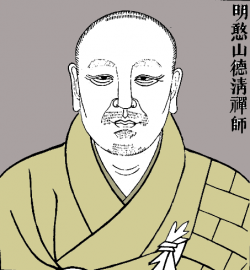Difference between revisions of "Hanshan Deqing"
| (2 intermediate revisions by the same user not shown) | |||
| Line 3: | Line 3: | ||
[[Hanshan Deqing]] ([[traditional]] {{Wiki|Chinese}}: [[憨山德清]]; pinyin: [[Hānshān Déqīng]]) (1546–1623) was a leading [[Buddhist]] [[monk]] of {{Wiki|Ming Dynasty}} {{Wiki|China}} who widely propagated the teachings of [[Chán]] and [[Pure Land]] [[Buddhism]]. | [[Hanshan Deqing]] ([[traditional]] {{Wiki|Chinese}}: [[憨山德清]]; pinyin: [[Hānshān Déqīng]]) (1546–1623) was a leading [[Buddhist]] [[monk]] of {{Wiki|Ming Dynasty}} {{Wiki|China}} who widely propagated the teachings of [[Chán]] and [[Pure Land]] [[Buddhism]]. | ||
| − | [[Hanshan Deqing]] is regarded as one of the great reformers of [[Chinese Buddhism]] during the {{Wiki|Ming Dynasty}}. Like many of his contemporaries, he advocated the dual practice of the [[Chán]] and [[Pure Land]] methods, and advocated the use of the [[niànfó]] ([[念佛]]) technique to {{Wiki|purify}} the [[mind]] for the [[attainment]] of [[self-realization]]. He also directed practitioners in the use of [[mantras]], as well as [[scripture]] reading. He was also renowned as a lecturer and commentator, and admired for his strict adherence to the [[precepts]]. | + | [[Hanshan Deqing]] is regarded as one of the great reformers of [[Chinese Buddhism]] during the {{Wiki|Ming Dynasty}}. Like many of his contemporaries, he advocated the dual practice of the [[Chán]] and [[Pure Land]] [[methods]], and advocated the use of the [[niànfó]] ([[念佛]]) technique to {{Wiki|purify}} the [[mind]] for the [[attainment]] of [[self-realization]]. He also directed practitioners in the use of [[mantras]], as well as [[scripture]] reading. He was also renowned as a lecturer and commentator, and admired for his strict adherence to the [[precepts]]. |
Teachings | Teachings | ||
| − | Regarding the use of [[meditation]] cases, or [[gōng'àn]] ([[公案]]; Jp. [[koan]]), [[Hanshan]] taught: | + | Regarding the use of [[meditation]] cases, or [[gōng'àn]] ([[公案]]; Jp. [[koan]]), [[Hanshan]] [[taught]]: |
| − | This method is not meant for you to think about the [[meaning]] of a [[gong-an]] as if the [[gong-an]] were a question for [[intellectual]] solution. Speaking of the [[hua-tou]] method, [[Dahui]] taught his [[disciples]] to kill the "sneaky [[mind]]" with a cold-blooded hand. | + | This method is not meant for you to think about the [[meaning]] of a [[gong-an]] as if the [[gong-an]] were a question for [[intellectual]] {{Wiki|solution}}. {{Wiki|Speaking}} of the [[hua-tou]] method, [[Dahui]] [[taught]] his [[disciples]] to kill the "sneaky [[mind]]" with a cold-blooded hand. |
| − | According to [[Jiang Wu]], for [[Chan]] [[masters]] such as [[Hanshan Deqing]], training through [[self]]-cultivation was encouraged, and [[Wikipedia:Cliché|clichéd]] or fiction [[Wikipedia:Formula|formulaic]] instructions were despised. Eminent [[monks]] who practiced [[meditation]] and {{Wiki|asceticism}} without proper [[Dharma]] [[transmission]] were acclaimed as acquiring "[[wisdom]] without [[teacher]]." [[Jiang Wu]] writes that [[Hanshan]] questioned the value of [[Dharma]] [[transmission]], and believed that the [[enlightenment]] of the [[mind]] was more important than nominal claims of transmission. | + | According to [[Jiang Wu]], for [[Chan]] [[masters]] such as [[Hanshan Deqing]], {{Wiki|training}} through [[self]]-[[cultivation]] was encouraged, and [[Wikipedia:Cliché|clichéd]] or {{Wiki|fiction}} [[Wikipedia:Formula|formulaic]] instructions were despised. {{Wiki|Eminent}} [[monks]] who practiced [[meditation]] and {{Wiki|asceticism}} without proper [[Dharma]] [[transmission]] were acclaimed as acquiring "[[wisdom]] without [[teacher]]." [[Jiang Wu]] writes that [[Hanshan]] questioned the value of [[Dharma]] [[transmission]], and believed that the [[enlightenment]] of the [[mind]] was more important than nominal claims of [[transmission]]. |
</poem> | </poem> | ||
{{W}} | {{W}} | ||
Latest revision as of 12:42, 26 December 2023
Hanshan Deqing (traditional Chinese: 憨山德清; pinyin: Hānshān Déqīng) (1546–1623) was a leading Buddhist monk of Ming Dynasty China who widely propagated the teachings of Chán and Pure Land Buddhism.
Hanshan Deqing is regarded as one of the great reformers of Chinese Buddhism during the Ming Dynasty. Like many of his contemporaries, he advocated the dual practice of the Chán and Pure Land methods, and advocated the use of the niànfó (念佛) technique to purify the mind for the attainment of self-realization. He also directed practitioners in the use of mantras, as well as scripture reading. He was also renowned as a lecturer and commentator, and admired for his strict adherence to the precepts.
Teachings
Regarding the use of meditation cases, or gōng'àn (公案; Jp. koan), Hanshan taught:
This method is not meant for you to think about the meaning of a gong-an as if the gong-an were a question for intellectual solution. Speaking of the hua-tou method, Dahui taught his disciples to kill the "sneaky mind" with a cold-blooded hand.
According to Jiang Wu, for Chan masters such as Hanshan Deqing, training through self-cultivation was encouraged, and clichéd or fiction formulaic instructions were despised. Eminent monks who practiced meditation and asceticism without proper Dharma transmission were acclaimed as acquiring "wisdom without teacher." Jiang Wu writes that Hanshan questioned the value of Dharma transmission, and believed that the enlightenment of the mind was more important than nominal claims of transmission.
